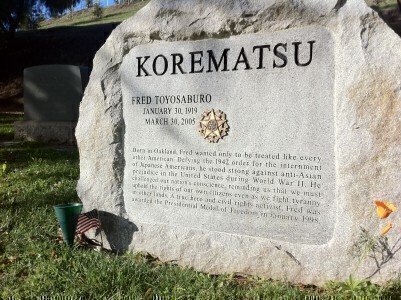[ad_1]
On today in 1942, President Franklin Roosevelt issued his most-controversial government order, an act that despatched greater than 100,000 folks to government-controlled amenities due to their ethnicity.

On December 7, 1941, Japanese navy forces attacked america base in Hawaii with out warning. Greater than 2,000 Individuals died within the assault, and a united Congress answered President Roosevelt’s request for warfare.
Roosevelt issued Presidential Govt Order 9066 on February 19, 1942, after fears generated by the Japanese assault made the protection of America’s West Coast a precedence. He directed the navy to isolate any citizen, if wanted, from a 60-mile-wide coastal space from Washington state to California and lengthening inland into southern Arizona.
The manager order didn’t specify Japanese-Individuals as a bunch, however the U.S. navy detained greater than 100,000 folks within the subsequent six months and moved them to camps and amenities with armed guards and barbed wire.
There have been 10 camps arrange nationally, and about 120,000 folks had been interned within the camps throughout the warfare. About two-thirds of them had been Japanese-Individuals who had been born in america. Individuals of Italian and German heritage had been additionally detained.
The controversial strikes had been met with authorized challenges, which finally had been unsuccessful in releasing the detainees from the camps, regardless of the intense constitutional points concerned.
Underneath one other provision, referred to as Exclusion Order No. 34, a Japanese-American citizen named Fred Toyosaburo Korematsu was arrested for going into hiding in Northern California after refusing to go to an internment camp. Korematsu appealed his conviction by the authorized system, and the Supreme Courtroom agreed to listen to the case in late 1944. The court docket had heard an analogous case in 1943, Hirabayashi v. United States, and determined that Gordon Hirabayashi, a university pupil, was responsible of violating a curfew order.
The Korematsu v. United States determination referenced the Hirabayashi case, nevertheless it additionally dominated on the power of the navy, in instances of warfare, to exclude and intern minority teams. The Courtroom dominated in a 6 to three vote that the federal government had the facility to arrest and intern Fred Korematsu. Justice Hugo Black, writing for almost all, included a paragraph that’s nonetheless debated at this time:
“It ought to be famous, to start with, that each one authorized restrictions which curtail the civil rights of a single racial group are instantly suspect. That’s not to say that each one such restrictions are unconstitutional. It’s to say that courts should topic them to probably the most inflexible scrutiny. Urgent public necessity could generally justify the existence of such restrictions; racial antagonism by no means can,” Black stated.
Later within the determination, Black defined the need of the navy’s determination. “Korematsu was not excluded from the Army Space due to hostility to him or his race. He was excluded as a result of we’re at warfare with the Japanese Empire as a result of the correctly constituted navy authorities feared an invasion of our West Coast and felt constrained to take correct safety measures, as a result of they determined that the navy urgency of the scenario demanded that each one residents of Japanese ancestry be segregated from the West Coast briefly,” he stated.
The three dissenting Justices stated Korematsu’s constitutional rights had been clearly violated. “I dissent, as a result of I believe the indeniable information exhibit a transparent violation of Constitutional rights,” stated Justice Owen Roberts.
“Such exclusion goes over ‘the very brink of constitutional energy,’ and falls into the ugly abyss of racism,” stated Justice Frank Murphy. “The broad provisions of the Invoice of Rights… are [not] suspended by the mere existence of a state of warfare. Distinctions primarily based on shade and ancestry are totally inconsistent with our traditions and beliefs.”
Justice Robert Jackson’s dissent highlighted each the racism that Murphy talked about and that whereas navy orders weren’t usually topic to judicial evaluation, “A navy order, nevertheless unconstitutional, just isn’t apt to last more than the navy emergency. Even throughout that interval, a succeeding commander could revoke all of it. However as soon as a judicial opinion rationalizes such an order to point out that it conforms to the Structure, or fairly rationalizes the Structure to point out that the Structure sanctions such an order, the Courtroom all the time has validated the precept of racial discrimination in legal process and of transplanting Americans.”
On the identical day, the Courtroom stated in one other determination, Ex Parte Endo, that the federal government couldn’t detain an “admittedly loyal citizen” indefinitely. The choice paved the best way for Japanese-Individuals to return to the West Coast, nevertheless it additionally didn’t contravene the Korematsu determination.
In subsequent years, the American internment coverage has been met with harsh criticism. In 1988, Congress awarded restitution funds of $20,000 to every survivor of the ten camps.
As a part of the Civil Liberties Act of 1988, Congress apologized “on behalf of the folks of america for the evacuation, relocation, and internment of such residents and everlasting resident aliens.” In 1983, federal courts had additionally overturned the unique convictions of Hirabayashi and Korematsu. Additionally, the Supreme Courtroom’s determination in Trump v. Hawaii (2018) successfully ended the Korematsu ruling’s legitimacy as precedent.
[ad_2]
Source link



:quality(70)/cloudfront-us-east-1.images.arcpublishing.com/archetype/WVXGX7OR5FEBZNWGGAL6B7WSTU.jpg)
